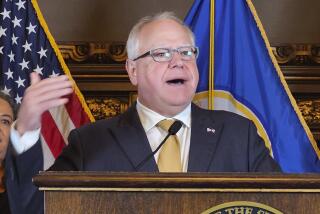Clinton Appears Set to Pick Lake as CIA Director
WASHINGTON — President Clinton has tentatively decided to name National Security Advisor Anthony Lake as director of the Central Intelligence Agency, and to make Lake’s deputy, Samuel “Sandy” Berger, his new national security advisor, White House officials said Tuesday.
After weeks of deliberation, Clinton has not made a final decision on his choices for secretary of State and secretary of Defense in his second term, the officials said. But they said the leading candidate for State appears to be Madeleine K. Albright, the U.S. ambassador to the United Nations. The most likely pick for Defense, they said, is Sen. William S. Cohen (R-Me.), who is retiring from the Senate.
White House spokesman Mike McCurry said Clinton has made “no final decisions at all” on the top national security posts for his second term. “A lot of this is still at the level of speculation.”
But he said the president is moving quickly toward his decisions and expects to make them today or Thursday. Formal announcements of the president’s choices could come as early as the end of this week, McCurry said.
Officials who requested anonymity said Clinton has settled on Lake as CIA chief and Berger as his successor as national security advisor. But one warned that those two selections could yet come undone, depending on the president’s choices for State and Defense.
Lake’s appointment would confirm the widespread speculation that CIA Director John M. Deutch does not have a future in the Clinton administration. Deutch, who came to the CIA from the No. 2 post at the Pentagon in early 1995, has not made any announcement about his intentions. He is said to have hoped to succeed Defense Secretary William J. Perry in Clinton’s second term.
But sources say his hopes for that promotion were dashed this fall when he angered the White House by telling Congress during public testimony that Saddam Hussein was better off than he was four years ago. One source says a “chill went through the West Wing of the White House” after Deutch’s testimony, and his future was quietly sealed.
Deutch is now said to be talking to various colleges about the possibility of returning to academia as a university president.
A move to the CIA would take Lake from the center of policymaking at the White House to a job that has become a career-killer in recent years. Each of Clinton’s first two CIA directors--Deutch and R. James Woolsey--lasted only two years before running afoul of the White House. Both struggled to run an agency mired in a funk from a spate of scandals and espionage betrayals while at the same time searching for a new mission after the collapse of the Soviet Union.
One big advantage for Lake, 57, is that for the last four years he has been one of the top consumers of intelligence within the White House and so would bring to the CIA a better sense of what kind of intelligence information will get Clinton’s attention.
But if nominated, Lake’s Senate confirmation hearings could become a forum for Republican attacks on Clinton’s foreign policy miscues.
Lake could, for instance, draw criticism for the White House’s handling of the Iran-Bosnia arms sales, in which the National Security Council kept the CIA in the dark about Clinton’s decision to give a green light to covert Iranian arms shipments into Bosnia.
In naming Berger as his second national security advisor, Clinton would be turning to a longtime friend he has known since they both worked on the 1972 presidential campaign of Sen. George S. McGovern.
Berger, 51, who worked in the Carter administration and became a Washington trade lawyer, was one of Clinton’s advisors when the Arkansas governor decided to run for president in 1992. At the time, Berger recruited Lake--who hardly knew Clinton then--as the campaign’s principal foreign policy advisor.
Clinton’s choice to replace Secretary of State Warren Christopher will be a signal of the activism of his foreign policy in his second term. Albright has been a notable foreign policy activist in her post at the U.N., seeking a role for the United States in solving problems around the world.
Another leading candidate, former Sen. George J. Mitchell (D-Me.), has played a quieter, more conciliatory role in international affairs, running delicate negotiations among Britain, Ireland and Catholic and Protestant factions in Northern Ireland.
Two weeks ago, White House officials let it be known that Mitchell appeared to be a leading candidate. That leak helped touch off a parade of Democratic women’s groups to the White House, pointing out that women had provided Clinton his electoral margin of victory and urging that the president seize this chance to name a woman to a high-profile foreign policy post.
Officials said Clinton has also considered Sen. Sam Nunn (D-Ga.) and former Assistant Secretary of State Richard C. Holbrooke, who negotiated the 1995 peace agreement in Bosnia-Herzegovina.
Choosing Cohen to replace Perry as secretary of Defense would allow the president to fulfill his desire to name at least one GOP figure to his Cabinet. Cohen is a moderate Republican who served on the Senate Intelligence Committee.
More to Read
Get the L.A. Times Politics newsletter
Deeply reported insights into legislation, politics and policy from Sacramento, Washington and beyond. In your inbox three times per week.
You may occasionally receive promotional content from the Los Angeles Times.










